Stuart Aken's Blog, page 242
October 20, 2013
The Annals of Imperial Rome, by Tacitus, Reviewed.
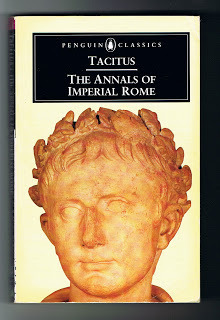 There have been many translations of this classic; the one I read was the Penguin Classics edition, translated by Michael Grant. I came across the book, which I’d heard of but not previously read, whilst perusing the shelves of a wonderful little bookshop on the island of Santorini. (You’ll find Atlantis Books in Oia, should you ever visit the island). Hardly typical holiday reading, I nevertheless read most of the book whilst lounging beside the pool on a comfortable sunbed under a hot sun.
There have been many translations of this classic; the one I read was the Penguin Classics edition, translated by Michael Grant. I came across the book, which I’d heard of but not previously read, whilst perusing the shelves of a wonderful little bookshop on the island of Santorini. (You’ll find Atlantis Books in Oia, should you ever visit the island). Hardly typical holiday reading, I nevertheless read most of the book whilst lounging beside the pool on a comfortable sunbed under a hot sun.It’s generally the case that most of our leaders here in UK are educated in the classics. I can see why they hold the odd views they often do, if Tacitus is any guide to the content of their learning.
 The book concentrates on certain aspects of Roman life that other historians have largely neglected, it seems. He is obsessed with legal cases, court actions and some fairly minor infringements of Roman law. Of course, there are accounts of battles, opinions on the various Emperors and tyrants (usually synonymous) who ruled the empire during the time he chronicles. First published around 102 AD, it deals with the short period from AD 14 to AD 68, when Christianity was in its infancy, but makes reference to many earlier historical events and personalities along the way.
The book concentrates on certain aspects of Roman life that other historians have largely neglected, it seems. He is obsessed with legal cases, court actions and some fairly minor infringements of Roman law. Of course, there are accounts of battles, opinions on the various Emperors and tyrants (usually synonymous) who ruled the empire during the time he chronicles. First published around 102 AD, it deals with the short period from AD 14 to AD 68, when Christianity was in its infancy, but makes reference to many earlier historical events and personalities along the way.The Annals reports on a period of history in which leadership was largely profoundly corrupt (a bit like the present, but with added casual execution, torture and murder – so perhaps not so different). Reflecting the beliefs of his day, he accepts the idea of mortal divinity whilst decrying the actions and morals of those made divine. He also believes in the existence of the legendary phoenix, so reliance on his belief system is probably unwise.
The book is dripping with the blood of the innocent mingled with that of the guilty. Suicide, murder, corruption, deceit, jealousy, nepotism, treachery, cheating, bribery, expedience, protection of those in office regardless of worth or merit, destruction of evidence, official blindness, flattery, preferential treatment, torture of lower classes to support claims of upper classes, incredible courage and noble sacrifice are all described. The reader is filled with a sense of how frightening it must have been to live in Rome and its empire of the time.
The absence of instant communication over great distance in an extensive empire that allowed distortions of truth and downright lies, shows how rumour could cause instant death, followed by regret when truth caught up with those guilty of the injustices. If you have ever wondered how some leaders of the modern world can behave in the way that they do, this book gives an understanding of the minds of rulers and those who support them. I’m glad I read it, but, if you have children, I’d advise you to keep the text away from them until they’re mature enough to sift the right from the wrong, the good from the bad, the truth from the speculation and assumption. A fascinating but uncomfortable read and a real insight into the way in which power corrupts and absolute power corrupts absolutely. Recommended.
Related articles
 A Sojourn on Santorini in the Sun
A Sojourn on Santorini in the Sun
 The mockery pervading human affairs in all their aspects
The mockery pervading human affairs in all their aspects

Published on October 20, 2013 05:25
Want a 10% Discount off a Kindle?
 If you live in the UK and you’re thinking of buying any of the Kindles on offer through Amazon, let me know and I’ll send you a coupon that will give you 10% off the device you buy.
If you live in the UK and you’re thinking of buying any of the Kindles on offer through Amazon, let me know and I’ll send you a coupon that will give you 10% off the device you buy.BUT I have only one to give away. And I’ll need your email address, as I have to forward the email I received from Amazon to you.SO, first come, first served.
Respond to me here.Related articles
 Amazon's Kindle Fire HDX is now available to pre-order in the UK
Amazon's Kindle Fire HDX is now available to pre-order in the UK
 PSA: Amazon's seven-inch Kindle Fire HDX now shipping
PSA: Amazon's seven-inch Kindle Fire HDX now shipping

Published on October 20, 2013 04:15
October 12, 2013
A-Z Guide to Santorini, Tony Oswin, Reviewed.
 Going on holiday to a new place? Makes sense to me to read a guidebook first. I’d always wanted to visit the volcanic island of Santorini, outpost of the Cyclades on the edge of the Aegean Sea, and a recent celebration gave me the chance.
Going on holiday to a new place? Makes sense to me to read a guidebook first. I’d always wanted to visit the volcanic island of Santorini, outpost of the Cyclades on the edge of the Aegean Sea, and a recent celebration gave me the chance.Tony Oswin’s guide is a POD (print on demand), so it can be, and is, updated very frequently, thereby avoiding the dated feel of some guides. He lives in the area and is in touch with changes, so keeps all those essentials up to date.
There’s an excellent précis of the island’s history as an introduction. This really sets the scene for the traveller and raises questions in the mind of the inquisitive tourist. He gives clues about the local culture, folklore, products and food and wine. The piece on getting to the island will be very useful to those independent souls who prefer to go under their own steam rather than rely on the package holiday.
His list of places of interest is extensive and comprehensive, covering all the major sites that will interest visitors.
He explains the attractions and disadvantages of the various beaches for those who love to paddle, swim, surf, or simply lie undisturbed under the sun without the benefit of any cover. He covers activities, sports, transport, money, weather, bugs, health, and gives the dates of local festivals and events.
There is information about which tavernas offer what food, which bars and supermarkets you might like to try, and what other shops you may find interesting.
In short, this is a comprehensive guide to the island. It lacks a detailed map but, as Tony explains, the inclusion of a useful map would make the book far more expensive and you can usually obtain a free road map from the car hire companies anyway. He does include plans of Fira, Akrotiri and Ancient Thera, all of which we found useful.
So, if you’re bound for the island that is now acknowledged by most as the site of the original Atlantis, I suggest you try this guide. Very easy to read and follow and full of very useful and interesting information. Highly recommended.
(If you’d like to see a set of pictures of the island, by all means feel free to visit my album onFacebook)Related articles
 A Sojourn on Santorini in the Sun
A Sojourn on Santorini in the Sun
 Santorini: Five reasons to visit the beautiful Greek island
Santorini: Five reasons to visit the beautiful Greek island
 Santorini - Beyond the Caldera
Santorini - Beyond the Caldera
 Santorini Snapped!
Santorini Snapped!
 A Day at Sea - the Straits of Santorini - Sept. 30
A Day at Sea - the Straits of Santorini - Sept. 30

Published on October 12, 2013 09:45
That Awkward Age, by Roger McGough, Reviewed.
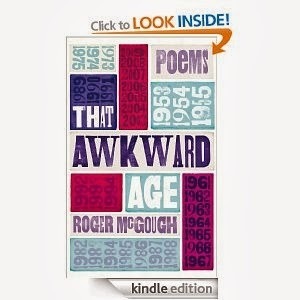 Brilliant! A poet with heart, soul and real wit. A poet who actually wants readers to be entertained and who understands that obscure composition acts against comprehension. Poetry is, after all, a means of communicating ideas as well as emotions, passions and impressions.
Brilliant! A poet with heart, soul and real wit. A poet who actually wants readers to be entertained and who understands that obscure composition acts against comprehension. Poetry is, after all, a means of communicating ideas as well as emotions, passions and impressions. Not generally a poetry reader, I came across this as a result of a comment made on my earlier review of Dylan Thomas’ Under Milk Wood. And I’m so glad I was introduced to it. It made me laugh, sigh, wonder and think. But, more importantly from a personal point of view, it inspired me to have a go at writing poetry; something I’ve dabbled in rarely but will now look at as a means of expressing ideas about those things that arouse passion in me.
If you’re a poetry lover, this will be for you, unless you prefer those obscure verses that require the reader to possess much esoteric knowledge or perform psychic interpretation of otherwise meaningless strings of words.
If, like me, you’ve tended to avoid poetry as inaccessible or irrelevant, then I urge you to sample this volume. It will change your mind and show you what can be achieved by a fluid and fertile mind responding to everyday events in terms that are expressive, clever, funny, touching, deeply observant and, most of all, accessible. Thoroughly recommended. Loved it! Related articles
 Roger McGough's stories on a plate
Roger McGough's stories on a plate
 Reading "That Awkward Age"
Reading "That Awkward Age"

Published on October 12, 2013 05:10
October 11, 2013
Guest Blogging on Writers' Village
John Yeoman, that excellent provider of information, humour and tutelage, as well as a writing contest that's definitely worth entering, invited me to guest post on his blog, Writers' Village. You can read the post via Related articles
 Guest post at the 'Writer's Shack'
Guest post at the 'Writer's Shack'
 Guest post on Catherine, Caffeinated
Guest post on Catherine, Caffeinated
 Writers' Village Contest 2013
Writers' Village Contest 2013
 Guest post: Why I Write Hot - And Why Women Read It by Melodie Campbell
Guest post: Why I Write Hot - And Why Women Read It by Melodie Campbell

 Guest post at the 'Writer's Shack'
Guest post at the 'Writer's Shack'
 Guest post on Catherine, Caffeinated
Guest post on Catherine, Caffeinated
 Writers' Village Contest 2013
Writers' Village Contest 2013
 Guest post: Why I Write Hot - And Why Women Read It by Melodie Campbell
Guest post: Why I Write Hot - And Why Women Read It by Melodie Campbell

Published on October 11, 2013 02:41
October 10, 2013
A Sojourn on Santorini in the Sun
 If you’re a regular, you’ll have noticed I’ve been a bit idle recently. Earlier this year, I retired from Santorini, site of the original Atlantis, has always fascinated us and we therefore decided to see whether it lived up to its reputation for both beauty and culture.employment, and my wife and I reached that milestone, the Silver Wedding. 25 years of marriage, happy and fulfilling, called for a special celebration and we chose to commemorate the occasion on a Greek island we hadn’t previously visited.
If you’re a regular, you’ll have noticed I’ve been a bit idle recently. Earlier this year, I retired from Santorini, site of the original Atlantis, has always fascinated us and we therefore decided to see whether it lived up to its reputation for both beauty and culture.employment, and my wife and I reached that milestone, the Silver Wedding. 25 years of marriage, happy and fulfilling, called for a special celebration and we chose to commemorate the occasion on a Greek island we hadn’t previously visited. It’s not a cheap destination, but a place where many of the hotels cater for couples rather than families, and we felt such freedom from children would suit us for a change. Our fortnight there was wonderful. The people of the island were lovely; friendly, warm, kind and eager to serve with relaxed efficiency. The rest was definitely welcome and the various trips we made served to enhance our knowledge of the island’s history and it’s precarious geological position.
On the small island of Nea Kameni (‘newly burnt’ – it’s only 500 years old), we stood at the edge of the current live crater of the volcano and heard our brilliant guide, Kim, explain that we were now standing on probably the most dangerous place on Earth. She did add that seismological equipment meant that we, and the islanders, would however receive about 5 days notice of any eruption!
 Our hotel, 28 Boutique, was within sight of the 7th century B.C. settlement of Ancient Thera, reached by a snaking narrow road up to a saddle some 290 metres (about 950 feet) above sea level. It looked challenging, so we climbed it, passed occasionally by the less energetic in hired cars or touring minibuses. Once at the site, we climbed to the centre of the ruins at a little over 360 metres (about 1180 feet). Extensive and well-maintained and presented, the remains give a good idea of life up to and including Roman times. Well worth the visit.
Our hotel, 28 Boutique, was within sight of the 7th century B.C. settlement of Ancient Thera, reached by a snaking narrow road up to a saddle some 290 metres (about 950 feet) above sea level. It looked challenging, so we climbed it, passed occasionally by the less energetic in hired cars or touring minibuses. Once at the site, we climbed to the centre of the ruins at a little over 360 metres (about 1180 feet). Extensive and well-maintained and presented, the remains give a good idea of life up to and including Roman times. Well worth the visit. We took the clearly marked but less manicured footpath (more like a goat track in parts) down to Perissa, where we intended to catch a water taxi back to our resort of Kamari. High winds meant the boats weren’t sailing so we could either catch a local bus, call for a taxi from the capital, Fira, or walk back the way we’d come. We did the latter and enjoyed the trek, taking advantage of the alternative views provided by the different direction of the walk.
Another outing took us to a local winery for a tasting, an almost abandoned village and to the beautiful town of Oia, to watch the sunset amongst thousands of other tourists, many from the cruise ships that visit the island every day. I had a more important motive for visiting Oia, however. There’s a bookshop there, Atlantis Books, which I was determined to find. Glad I did. I left them a signed copy of Breaking Faith to add to their amazing international collection of fiction and nonfiction books and bought a copy of The Annals of Imperial Rome by Tacitus, which I’ve intended to read for a long time.
We visited the Spa of theGods, overlooking the caldera, where we were massaged in a cave by two slender Greek maidens with skill and surprising strength, leaving us utterly relaxed. A luxury we allowed ourselves in spite of its expense.
A visit to the local outdoor cinema in Kamari allowed us to watch Great Expectations under a clear sky whilst drinking from the bar. A very pleasant experience. Akrotiri, the site now considered by many historians and archaeologists to be the location of the original settlement of Atlantis, was interesting but, covered and formally directed, lacked the immediacy and intimacy of Ancient Thera.
A cruise on a local sailing boat took us to the small island of Thirassia, population 150, where we ate at the small tavern on the harbour, Captain John’s, enjoying some local delicacies and drinking local wine. We then braved the choppy seas to watch the sun as it set behind the tiny (and newest) island of Aspronissi in the caldera.
An excellent holiday and the reason for my silence over the past days.
Back home now and ready to continue with the fantasy trilogy and other projects I have in mind. So, you’ll find some book reviews appearing here in the next few days, along with character sketches of some of the major characters in Joinings, volume one of the fantasy trilogy, A Seared Sky, due to be published by Fantastic Books Publishing later this year.
I look forward to your comments, as ever.Related articles
 Chasing Santorini Sunsets
Chasing Santorini Sunsets
 Sunshine in Santorini
Sunshine in Santorini
 Santorini: Five reasons to visit the beautiful Greek island
Santorini: Five reasons to visit the beautiful Greek island
 Boats, donkeys and a volcano - Kamari, Santorini, Greece
Boats, donkeys and a volcano - Kamari, Santorini, Greece
 Santorini - Beyond the Caldera
Santorini - Beyond the Caldera

Published on October 10, 2013 08:06
September 26, 2013
Building a World from Scratch.
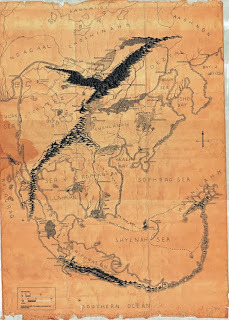 Writing fantasy generally requires the invention of a world different from the one in which we live our daily lives; especially epic fantasy. I’m currently writing volume three of such a trilogy. So, how did I go about developing the world where my story takes place?
Writing fantasy generally requires the invention of a world different from the one in which we live our daily lives; especially epic fantasy. I’m currently writing volume three of such a trilogy. So, how did I go about developing the world where my story takes place?The first consideration in fiction has to be ‘theme’. As always in such tales, the basic underlying theme is good versus evil. But there are other ideas layered over that. I’m fascinated by the continuing discussion whether religions rely on what seems like self-delusion to persuade the faithful to join and remain in their ranks. Another aspect of life that intrigues me is the duplicity of our attitude to nakedness. And the way that power is given, often voluntarily, to those who least deserve it has always baffled me. So, these themes are also explored in the books.
Primarily, of course, it’s a story, an adventure story with romantic elements, and a means to entertain my readers. I’m thoroughly enjoying weaving the tale. We all love stories; have done since the very beginnings of language.
Before I could ‘invent’ my world, I had to develop systems of history, politics, religions, customs and traditions. I considered how my characters, in their separate societies, would dress, where and how they would live, what would occupy them and how they would make their various ways through the world. I developed ideas on the evolution of villages, towns and cities. I invented names for these places and the characters who would inhabit them. Names that had to follow some sort of logic in formation, of course. I researched travel by sea, river, horse, camel and on foot. And then I studied some geology and geography so that I could devise a realistic map for my world.
Maps and fantasy are almost inseparable. I wanted mine to do more than locate the places featured in the story; I wanted the map to be a central part of that story and an item of interest in itself. I drew it on a large (A1 – 34x23 inches for those who don’t know) piece of sugar paper in ink, with a drawing pen. I gave it some relief, so that there are mountains, plains, deserts, forests, rivers, seas, islands and lakes. I wanted to make this a real place in the mind of the reader, so it had to be as real as possible to me first. And, I confess, I borrowed from our own beautiful Earth to arrive at a credible outline of my lands.
Once drawn, I populated it with the names I’d made up, checking each on Google to ensure none of the chosen names belonged to anyone else or meant something inappropriate in a foreign language (there is a story that Julie Andrews’ book for children, The Last of the Really Great Whangdoodlescaused her some embarrassment when she was told that ‘whangdoodle’ had a rather obvious and obscene meaning in Australia. I’ve been unable to discover any truth in this, and suspect it’s apocryphal, but it still serves as a warning about the use of unknown words.).
All this work took time and all had to be done before I could write a word of the story. Over the period of time it took to complete the preparation and development, the map turned, as hoped, from off-white to a shade of parchment. A little damp here and there installed stains and a few folds creased the map so that it now looks like a piece of ancient cartography that has undertaken several journeys. I added a compass and a rule in kilometres and miles so that readers can appreciate distances. I’ve reproduced it here for you to explore, if you wish.
Only after all this preparation did I begin to think about writing the story. But that’s for another post. It will come, as will some character sketches, to whet your appetite for the first volume, which I hope will be published later this year. Meanwhile, the third volume is growing, standing at 111,000 words as I compose this post. That means I’m a little over half way through the first daft of the final book. Books one and two are ready for publication.Related articles
 The Place of the Map in Fantasy. Can You Help?
The Place of the Map in Fantasy. Can You Help?
 Character Development is Good for You.
Character Development is Good for You.
 The building blocks of writing.
The building blocks of writing.
 "The Last of the Really Great Whangdoodles."
"The Last of the Really Great Whangdoodles."

Published on September 26, 2013 01:00
September 20, 2013
Under Milk Wood, by Dylan Thomas, Reviewed.
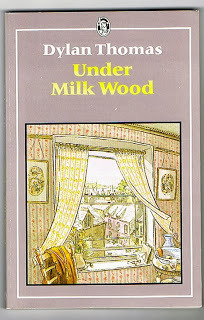 Many years ago, I bought the vinyl LP of the BBC radio production of Dylan Thomas’ Under Milk Wood. It’s subtitled, ‘A Play for Voices’, and that’s about as accurate a description as I can think of. The radio production is superb, with the brilliant Richard Burton articulating the First Voice in his own inimitable style. A wonderful listening experience.
Many years ago, I bought the vinyl LP of the BBC radio production of Dylan Thomas’ Under Milk Wood. It’s subtitled, ‘A Play for Voices’, and that’s about as accurate a description as I can think of. The radio production is superb, with the brilliant Richard Burton articulating the First Voice in his own inimitable style. A wonderful listening experience.But what of the text? I picked up a copy from a small independent bookshop whilst shopping in Beverley with my daughter for a student cook book, which we also found.
The text is inevitably flavoured by my memory of the broadcast. I hear the various voices, all of them Welsh, as I turn the pages. It’s a dazzling piece of writing. The characters are alive and so distinctive. The words bring to life real people, individuals drawn from Dylan’s past. He must have been a great observer of people, if his understanding of them is anything to go by. The stories they tell, the opinions they express, the incidents they cause and observe, all point to a creator who lived with them on intimate terms.
The occasional melancholy and touch of genuine sorrow apart, the play is bursting with humour. Here is a piece that celebrates life, celebrates what it is to be a human being. It is, unescapably, very Welsh in terms of language and a view of village life, but it manages to encompass all human experience in spite of its parochial setting. I laughed out loud through much of the reading, so full of joy and exuberance is the text.
If you want a brief interlude of fun, entertainment and wonder at the sheer genius of a man who could do amazing things with words, this is for you. This is one of those rare experiences in life: a perfectly created piece of imaginative storytelling. Brilliant. You’ll love it!Related articles
 Under Milk Wood - 1954 - Argo // Dylan Thomas Narrating Under Milk Wood - 1956 - Caedmon
Under Milk Wood - 1954 - Argo // Dylan Thomas Narrating Under Milk Wood - 1956 - Caedmon
 Under Milk Wood (Dylan Thomas)
Under Milk Wood (Dylan Thomas)
 Lovely It Was - A Cuppa Tea In Laugharne
Lovely It Was - A Cuppa Tea In Laugharne

Published on September 20, 2013 02:07
September 19, 2013
Reviewing the Reviewers?
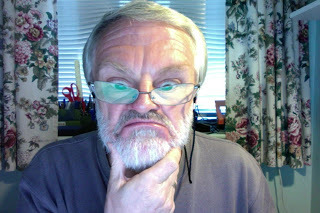 What are reviews to you, as a writer, as a reader? Do they influence what you write, what you read?As a writer, in particular, do some remarks from reviews of your work stay with you? Do they haunt or taunt, or do they inspire and motivate you?
What are reviews to you, as a writer, as a reader? Do they influence what you write, what you read?As a writer, in particular, do some remarks from reviews of your work stay with you? Do they haunt or taunt, or do they inspire and motivate you? I recently came across a feature on a site I use daily, but visit only rarely. (A contradiction? Not really, the site, Booktrakr, provides me with daily stats on book sales, but I visit it occasionally to update my info.) I hadn’t been aware that they not only collect sales data but also reproduce all the reviews that appear on the sites where they gather their information. As a result, I was able to see reviews of my work that had previously passed me by. By the way, if you’re a published author, you might like to try the site. It’s still in beta, and there are still a few odd glitches, but they’re improving their data all the time. It was through this website that I discovered one of my books had suddenly jumped up the lists to appear in a couple of top 100 lists.
Back to the matter in hand. I read these reviews and realised that readers approach books from very personal angles. One, in particular, stuck out. The book had received a large number of 5 star reviews, with most of the readers completely ‘getting’ the story, the themes and the approach. One, however, awarded a 2 star review but added the codicil that she’d enjoyed all aspects of the story but one. There’s a graphic scene in the novel, describing a savage rape. It’s there for a very specific purpose and is deliberately as far away from erotic as it can be. All other reviewers understood the purpose of the scene and that it wasn’t intended to be erotic. But this reviewer criticised the inclusion, saying that rape is not erotic. Well, yes. Obviously. So, this one reader had missed that point entirely.
As a writer, it would be very easy to get hung up on such a point: had I written it in a way that was ambiguous? Well, no. The other reviews showed it had been understood for what it was. But it is too easy for us to take such things personally. All readers come to books with their own set of experiences, their past, their nurturing and their natures. We all know that it’s impossible, and indeed undesirable, to please all of the people all of the time, of course. But I’ve talked with writers who would take such criticism to heart. In fact, some very promising writers, sensitive and gentle souls with something important to say and the talent to say it well, have actually given up writing as a result of some critical point that they’ve taken personally.
What I’m trying to stress here is that a review is a comment on the work, not on the author. Reviewers doesn’t know the author, they only know the work, and they see that through their own particular filters. It’s inevitable that a writer will attract adverse comment. There is no way to avoid it. Some would say that a piece of work that fails to attract dissent is not doing its job properly. And, of course, we all understand that there are trolls out there whose only purpose in life is to vent their frustration and their inability to communicate effectively by making personal insults. Such irrational and cheap remarks can only be ignored. But the comments from a thoughtful reviewer have the potential to alter a writer’s view of his work.
I’d never expect a reviewer to alter their opinion and I certainly wouldn’t get involved in a slanging match with anyone who had something adverse to say about my work. It’s utterly non-productive and makes the writer look both foolish and desperate. So, I’d advise writers simply to accept that there will be some negative opinions of your work. Some will be due to mistaken impressions, some will be formed from points of view that oppose your own, some will reflect the experiences of the reviewer and some will be true, of course. Provided the balance is in favour, and positive, there’s little point in allowing it to influence you. Obviously, if the majority opinion is negative in a specific way, it might be worth examining the piece anew. But, in general, take what you can from every point of view and then get on with your writing, in your voice. That’s why you write, isn’t it? To express your opinion, to show the world as it is through your eyes?
So, don’t blame the reviewers. Accept what they say, or make sure you never read your reviews if you’re unable to take them for what they are: the view of that piece of work by that reviewer; no more, no less.
And, whilst I’m on this topic, let me use the opportunity to thank all those who have reviewed my books. I truly appreciate your comments and the time and effort you make to let others know your thoughts.
Oh, and if you're interested, many of the reviews of my work are listed with the books under the tab above, labelled 'Published Work'.Related articles
 Poacher-turned-gamekeeper
Poacher-turned-gamekeeper
 Why Not Think of Book Reviewers as Beta Readers?
Why Not Think of Book Reviewers as Beta Readers?
 When Readers Go Rogue - Bullying With Reviews
When Readers Go Rogue - Bullying With Reviews
 How to handle bad reviews
How to handle bad reviews

Published on September 19, 2013 03:08
September 18, 2013
Deception, by Mary Jay, Reviewed.
 Mary Jay’s first novel, Deception, explores the lives and relationships of those who come into contact with her central character. Miranda’s own relationships are central and the complex characters with whom she interacts are all substantial, individual and realistically realised. Readers of my reviews will know that character is the one aspect I must engage with in a novel and it certainly applies to this one.
Mary Jay’s first novel, Deception, explores the lives and relationships of those who come into contact with her central character. Miranda’s own relationships are central and the complex characters with whom she interacts are all substantial, individual and realistically realised. Readers of my reviews will know that character is the one aspect I must engage with in a novel and it certainly applies to this one.Do not expect fast action, violence or sex. But, if you’re looking for a developing story laced with intrigue and a psychological menace that lurks in the background, always threatening to startle and surprise, you’ll find it here. The love story develops slowly and grows as Miranda explores her feelings and attempts to resolve her internal conflicts through engagement with her creative self. A painter and a college tutor, she lives a lot of her life on the edge, rather than as a central or pivotal figure. But success in her artistic endeavours is rising above the horizon and she believes her love life is mirroring that shift.
There are undercurrents, mostly subtle and shadowy, that bring gnawing threats to Miranda’s personal and professional lives. A student hovers in her background, his aims and motivation always hinted at rather than made explicit. As a lover, she chooses to be involved with a mountaineer, a man so far from her everyday experience in almost every way that the reader wonders whether she is actually afraid of evolving a relationship that might have a hope of permanence.
Just as she makes the decisions she might have made to her advantage earlier in life, circumstances take over and result in the sudden, unexpected and ultimately inevitable denouement. It is an ending that leaves the audience with questions to ask, allowing the maturity and experience of the reader to answer those maybes, might-have-beens and what-ifs for himself.
Published by Fantastic Books Publishing, this novel has slow and gentle start that draws the reader in and, as he comes to know the characters, drives the desire to complete the read. A thoughtful novel and one I recommend to the thoughtful reader.
Buying links:Smashwords Amazon US Amazon UK
Published on September 18, 2013 07:55



